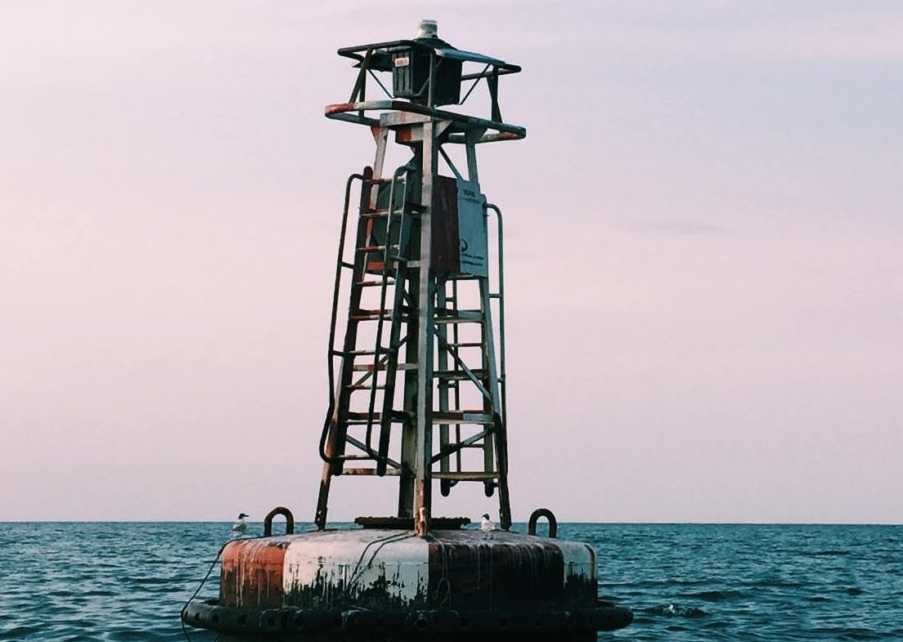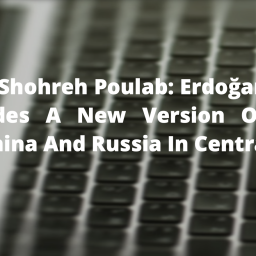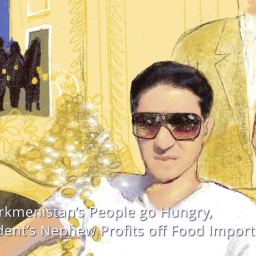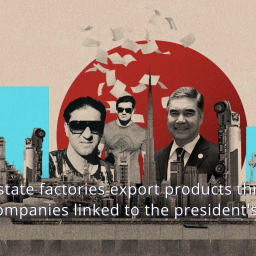Turkmenistan’s model of kleptocracy is toxic — and the international community knows about it.

Turkmenistan is one of the most closed and repressive countries in the world. Its president, Gurbanguly Berdymukhamedov, has created one of the most intense and brutal cults of personality on the planet; those who disagree with him are silenced, imprisoned, and tortured, and this nation of fewer than three million individuals has at least 121 forcibly disappeared political prisoners in its penal system, and countless others held for any kind of perceived insubordination.
A country with the world’s fourth-largest gas reserves, Turkmenistan’s economy is driven by hydrocarbons: Oil and gas exports make up 25% of the nation’s GDP. Rather than enriching the population, this money goes into the private hands of the president — or his private bank account — leaving the country’s people impoverished, malnourished, and isolated from the rest of the world.
That Turkmenistan’s citizens live in isolation and under severe repression is without a doubt. However, the elites — the kleptocrats — running the country and robbing Turkmenistan’s citizens of its natural wealth are anything but isolated.
Our recent report by Crude Accountability, “Turkmenistan: A Model Kleptocracy,” documents the shocking and outright robbery committed by the president of Turkmenistan, his family, and his closest confidants. It documents how the leadership of the country — mostly the president himself — has robbed the population of the nation’s natural resource wealth by using the money on vanity projects and to amass colossal personal wealth, most of which is held in bank accounts outside of the country.
What makes this “kleptocracy” worse than ordinary corruption is that it occurs with the participation, or at least silent complicity, of the international community. Corporations, such as Bouygues, Itera/Areti, Polimeks, and Calik Holding, and state-owned companies, such as China National Petroleum Corporation, have long made their fortunes in Turkmenistan, entertaining the deluded fantasies of President Berdymukhamedov and President Saparmurat Niyazov before him. Niyazov’s “spiritual” book, the Ruhnama, was required reading for school children throughout Turkmenistan until recently and has been translated into numerous western languages in exchange for corporate access to the country. Corporate executives present the president with personal gifts, such as yachts and fancy cars. In return, their companies are given investment opportunities in the country.
How is this all possible?
THE NEPOTISM THAT STRENGTHENS THE KLEPTOCRACY
President Berdymukhamedov’s family controls most business inside Turkmenistan, with his sisters playing a key role in business ventures as diverse as jewelry, construction, tobacco products, tourism, and textiles. As we have documented in the report, Berdymukhamedov’s family owns much of the lucrative business inside the country, controlling enterprises small and large. Their corruption, however, is not limited to business ventures. Berdymukhamedov’s sister, Gulnabat, is not only involved in construction projects, such as the lucrative seaside resort in Avaza and the buildings for the fifth International Asian Indoor and Martial Arts Games that Turkmenistan hosted in 2017, but has also taken control of the International Red Crescent, using the charity as a money-making vehicle for her personal benefit. Berdymukhamedov’s son, Serdar, is being groomed as a possible successor to his father. He was appointed deputy chairman of the Cabinet of Ministers in February 2021, and is the chairman of the Supreme Control Chamber of Turkmenistan, which allows him to oversee financial flows.
In the category of most surreal, a member of the Niyazov family (the first president of Turkmenistan) owned shares in Trockland, the company that owns the Berlin building that houses the Checkpoint Charlie Museum. The memorial to those who fought against Cold War era authoritarianism will be joined by the apartments, shops, and Hard Rock Hotel that Trockland plans to build.
BANKS ARE HELPING TOO
It isn’t just corporations that play along with Turkmenistan’s kleptocrats, though. Deutsche Bank, Germany’s largest bank and one of the top financial institutions in the world, holds bank accounts for the Turkmen state, and, despite queries from Crude Accountability, has refused to provide information about why it conducts business with one of the world’s most brutal and repressive regimes. (See the report for the full response from Deutsche Bank.)
Until recently, international financial institutions, including the World Bank, the International Monetary Fund, and the European Bank for Reconstruction and Development, have played along with Turkmenistan’s financial fiction, publishing economic statistics, such as annual GDP in dollars and hydrocarbon sector export figures from the Turkmen government without critical analysis of the data. According to 2015 statistics, Turkmenistan’s foreign reserves amounted to $35 billion. This does not explain the country’s severe ongoing economic crisis in which basic consumer goods are hard to come by and the foreign currency market has collapsed, and calls into question whether the money still exists.
THE KLEPTOCRACY’S TRAGIC IMPLICATIONS
As the president and his family keep getting wealthier, Turkmenistan’s ordinary citizens suffer in poverty. The official unemployment rate is around 4%, but unofficial estimates place it as high as 60% in certain parts of the country. Although the government has refused to acknowledge the presence of COVID-19 in the country, claiming that a possible cause of infection was toxic dust blowing from the Aral Sea, all citizens are required to be vaccinated. The borders are virtually closed. The media, including the Internet, is completely controlled by the state, and civil society has been driven completely underground or overseas.
Hundreds of political prisoners languish in Turkmenistan’s prison system, many of them former state officials, found guilty of economic crimes that current high-level bureaucrats in the government appear guilty of themselves. Others have been charged with economic crimes, Islamic extremism, for engaging in civil society activities, and for allegedly plotting to overthrow the previous president. A number of these prisoners have served their full sentences, and yet have not been released from prison in a gross violation of their rights.
That Turkmenistan’s citizens live in isolation and under severe repression is without a doubt. However, the elites — the kleptocrats — running the country and robbing Turkmenistan’s citizens of its natural wealth are anything but isolated. They benefit from corrupt business, the international laws that allow them to profit from natural resources, and massive personal wealth accumulation at the expense of ordinary Turkmen citizens. The web of kleptocrats and enablers is interconnected, international, and interdependent. Without each other, they cannot gather the wealth, influence, and power that they hold.
The real issue is: Will the kleptocrats and their enablers ever be held accountable? Don’t hold your breath.
Kate Watters is co-founder and executive director of Crude Accountability, a human rights and environmental NGO that works with activists and communities impacted by oil and gas development.
Tom Mayne is a freelance researcher and writer from London. After graduating from Oxford University with a degree in Russian and Czech, he worked for 12 years as a senior campaigner for Global Witness, an anti-corruption NGO that works to end the exploitation of natural resources. Since leaving Global Witness, he has continued his research on the ruling families of Central Asian autocracies, and currently holds a research fellowship at the University of Exeter where he is researching money laundering in the UK real estate sector.


